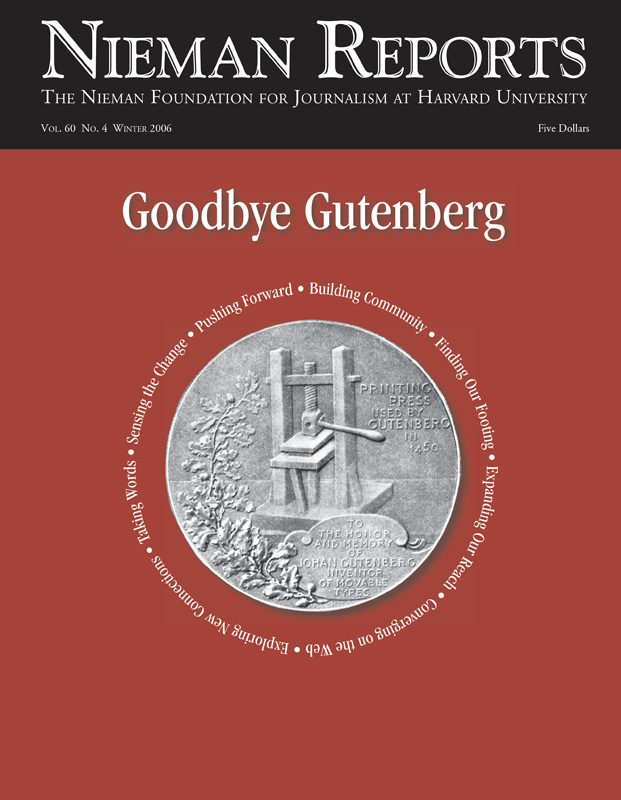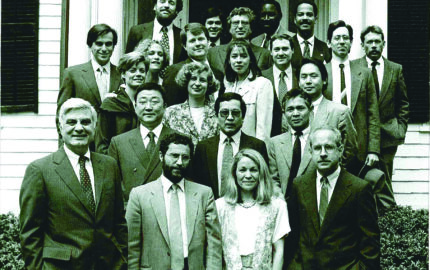In almost any gathering of journalists these days, the topic eventually turns to the state of our craft and the commercial enterprises that support it. A rapid transformation is taking place in journalism. The changes are driven by digital technologies, many of which have been brilliantly adopted by entrepreneurs capitalizing on opportunities they've seen that mainstream news companies failed to anticipate.
Members of the last Nieman class were consumed with worry over the demise of Knight Ridder newspapers and its potential implications for newspapers owned by publicly traded companies. (Two members of that class returned to jobs at their former Knight Ridder newspapers to find different ownership than when they'd left.) The relentless demand of institutional shareholders for extremely high profit margins and strong stock prices is incompatible with the historic role of the printed press as a public trust. During an afternoon discussion in late spring the fellows worked through two case studies with professors from the Harvard Business School; they examined how Google, a start-up, and Rupert Murdoch's News Corporation, from the mainstream media, had shaped their business models to succeed in the digital age.
During their weekly discussions at Lippmann House, our fellows also examined and reexamined the more traditional issues of journalistic performance and, in particular, challenges to the watchdog role of the press. They were haunted by the acknowledgement that the press failed to report aggressively and authoritatively during the months leading up to the Iraq War. And they were troubled by the deepening conflicts news organizations are experiencing with the Bush administration and the federal courts over the journalistic disclosure of information, held as secret, that the public should have.
During a recent meeting of the foundation's advisory board, I asked for thoughts on how the Nieman Foundation might serve as an educational force in the transformation of journalism. It is a question we are still considering and one that invites thoughts and ideas from our family of alumni.
The influence of digital technology on journalism is realized largely through the Internet, which has become a powerful interactive platform, engaging voices that have not usually been as occupied as they are now in the conversation about news and newsgathering. The Nieman Foundation makes good use of online opportunities to encourage transformative thinking about journalism. What follows are examples of how we serve this purpose:
- Nieman Reports utilizes eMprint templates, developed by Roger Fidler at the University of Missouri's School of Journalism, to create newsbooks of its articles on specific themes in an easy to read and download format.
- The Nieman Watchdog Web site encourages investigative reporting by drawing on authorities in various fields to offer analysis of issues and questions the press might consider asking.
- The Nieman Narrative Digest, launched in April, advances the practice of narrative journalism by providing useful and inspiring resources for writers, editors, teachers and students of narrative, and offering a forum for the exchange of ideas and resources.
The foundation also can be helpful through its occasional seminars for journalists and the annual Nieman Narrative Conference. Such initiatives are part of the foundation's service to journalism. Though each is educational in nature, they don't fully address the question of what role the foundation, as a whole, might play.
The answer might be found in thinking about the core strength, which is the fellowship program. Through the years, Nieman Fellowships have been held largely by print journalists. Will the print media, especially newspapers, continue to provide the most serious, authoritative content? In recent Nieman classes, an increasing number of broadcast and online journalists, documentary filmmakers and freelance writers have been represented in the applicant pools and in the fellows selected. In future years, we need to ask ourselves, as part of our selection process, what the best mix of skills and work site will be to meet the needs of the digital era.
Every news medium, from newspapers to blogs, needs journalists who are committed to adhering to—and, we hope, elevating—the standards of journalism, who understand the press's role and responsibility, and who can bring authoritative knowledge to the stories they handle.
The Nieman experience can encourage more investigative reporting, contribute to a breadth and depth of global understanding, open fellows' thinking to new possibilities, help them continue a serious dialogue about journalism, renew their commitment to serving the public interest and sustaining our enduring values, and prepare them to contribute to the learning and development of their journalistic colleagues. When we are able to accomplish these things, the Nieman Fellowships will have an essential role to play in a challenging time for journalism.



